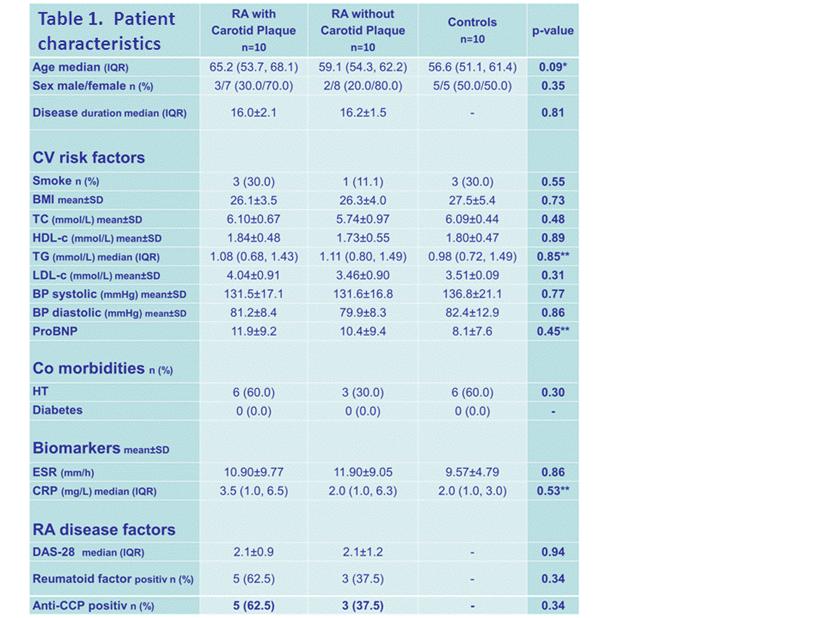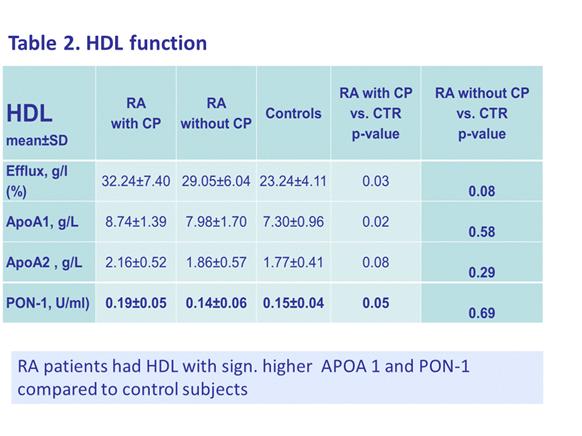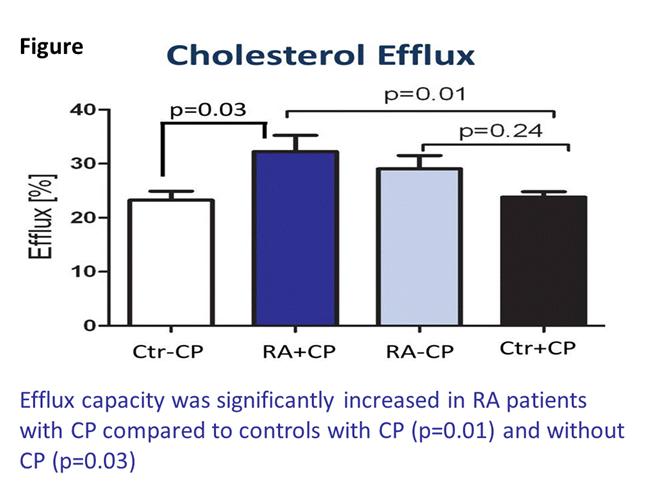Session Information
Title: Rheumatoid Arthritis - Clinical Aspects (ACR): Comorbidities, Treatment Outcomes and Mortality
Session Type: Abstract Submissions (ACR)
Reverse cholesterol transport (RCT) is a major anti atherogenic function of high density lipoprotein cholesterol (HDL) and has been shown to be related to disease activity in patients with rheumatoid arthritis (RA).Our aim was to evaluate if atherosclerosis affects HDL function differently in RA patients compared to controls.
Methods
RA patients from the ORA register and the EURIDISS cohorts without cardiovascular (CV) disease and not using statins or biologic DMARDS were included. Healthy community controls were selected by Statistics Norway. RCT was measured as plasma induced 14C-cholesterol efflux from 14C-cholesterol loaded human THP1 macrophages as previously described. Apolipoprotein (Apo) A1 and paraoxonase-1 (PON-1) activity were measured.
Results
RA patients, 10 with and 10 without carotid plaques (CP), and 10 controls were age and gender matched (Table 1). Traditional CV risk factors were comparable in RA patients with and without CP and controls; smoking: p=0.55, systolic blood pressure: p=0.77, total cholesterol: p=0.48, LDL-c p=0.31, HDL-c: p= 0.89, triglycerides: p=0.85. None had diabetes. Untraditional biomarkers of CV disease such as CRP and ESR were also comparable across the 3 groups; p=0.53, p=0.86 and p=0.45, respectively. RA disease factors as disease duration, rheumatoid factor, anti-CCP and DAS-28 were comparable between RA patients with and without CP (p=0.81, p=0.34, p=0.34 and p=0.94). Efflux capacity was significantly increased in RA patients with CP compared both to controls without CP (p=0.03) and controls with CP (p=0.01)(Table 2). Likewise, both ApoA1 and PON-1 activity were increased in RA patients with CP compared to controls (p=0.02 and p=0.05, respectively). Further, APOA1 and PON-1 activity were comparable between RA patients without CP and controls (p=0.58 and p=0.69, respectively).
Conclusion
The cholesterol efflux capacity was increased in RA patients with early atherosclerosis compared to controls, independent of HDL level and CRP. Our findings indicate an association between atherosclerosis and upgraded HDL function in patients with RA having low disease activity, possibly as a compensatory mechanism to the atherosclerotic process. This study is hypothesis generating and larger studies are warranted to verify these findings.
Disclosure:
S. Rollefstad,
None;
B. Halvorsen,
None;
T. Skarpengland,
None;
S. Provan,
None;
T. K. Kvien,
None;
A. G. Semb,
None.
« Back to 2014 ACR/ARHP Annual Meeting
ACR Meeting Abstracts - https://acrabstracts.org/abstract/asymptomatic-carotid-plaques-in-ra-patients-are-associated-with-increased-hdl-function/



